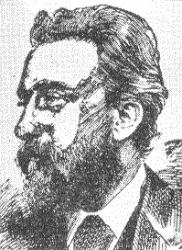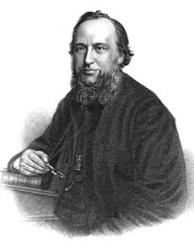Planning worship?
Check out our sister site, ZeteoSearch.org,
for 20+ additional resources related to your search.
- |
User Links
Person Results
Henry Alford

1810 - 1871 Author of "Forward! Be Our Watchword" in The Cyber Hymnal Alford, Henry, D.D., son of the Rev. Henry Alford, Rector of Aston Sandford, b. at 25 Alfred Place, Bedford Row, London, Oct. 7, 1810, and educated at Trinity College, Cambridge, graduating in honours, in 1832. In 1833 he was ordained to the Curacy of Ampton. Subsequently he held the Vicarage of Wymeswold, 1835-1853,--the Incumbency of Quebec Chapel, London, 1853-1857; and the Deanery of Canterbury, 1857 to his death, which took. place at Canterbury, Jan. 12, 1871. In addition he held several important appointments, including that of a Fellow of Trinity, and the Hulsean Lectureship, 1841-2. His literary labours extended to every department of literature, but his noblest undertaking was his edition of the Greek Testament, the result of 20 years' labour. His hymnological and poetical works, given below, were numerous, and included the compiling of collections, the composition of original hymns, and translations from other languages. As a hymn-writer he added little to his literary reputation. The rhythm of his hymns is musical, but the poetry is neither striking, nor the thought original. They are evangelical in their teaching, but somewhat cold and conventional. They vary greatly in merit, the most popular being "Come, ye thankful people, come," "In token that thou shalt not fear," and "Forward be our watchword." His collections, the Psalms and Hymns of 1844, and the Year of Praise, 1867, have not achieved a marked success. His poetical and hymnological works include—
(1) Hymns in the Christian Observer and the Christian Guardian, 1830. (2) Poems and Poetical Fragments (no name), Cambridge, J. J. Deighton, 1833. (3) The School of the Heart, and other Poems, Cambridge, Pitt Press, 1835. (4) Hymns for the Sundays and Festivals throughout the Year, &c.,Lond., Longman ft Co., 1836. (5) Psalms and Hymns, adapted for the Sundays and Holidays throughout the year, &c, Lond., Rivington, 1844. (6) Poetical Works, 2 vols., Lond., Rivington, 1845. (7) Select Poetical Works, London, Rivington, 1851. (8) An American ed. of his Poems, Boston, Ticknor, Reed & Field, 1853(9) Passing away, and Life's Answer, poems in Macmillan's Magazine, 1863. (10) Evening Hexameters, in Good Words, 1864. (11) On Church Hymn Books, in the Contemporary Review, 1866. (12) Year of Praise, London, A. Strahan, 1867. (13) Poetical Works, 1868. (14) The Lord's Prayer, 1869. (15) Prose Hymns, 1844. (16) Abbot of Muchelnaye, 1841. (17) Hymns in British Magazine, 1832. (18) A translation of Cantemus cuncti, q.v.
-- John Julian, Dictionary of Hymnology (1907)
==================
Alford, Henry, p. 39, ii. The following additional hymns by Dean Alford are in common use:—
1. Herald in the wilderness. St. John Baptist. (1867.)
2. Let the Church of God rejoice. SS. Simon and Jude. (1844, but not in his Psalms & Hymns of that year.)
3. Not in anything we do. Sexagesima. (1867.)
4. O Thou at Whose divine command. Sexagesima. (1844.)
5. 0 why on death so bent? Lent. (1867.)
6. Of all the honours man may wear. St. Andrew's Day. (1867.)
7. Our year of grace is wearing to a close. Close of the Year. (1867.)
8. Saviour, Thy Father's promise send. Whit-sunday. (1844.)
9. Since we kept the Saviour's birth. 1st Sunday after Trinity. (1867.)
10. Thou that art the Father's Word. Epiphany. (1844.)
11. Thou who on that wondrous journey. Quinquagesima. (1867.)
12. Through Israel's coasts in times of old. 2nd Sunday after Epiphany. (1867.)
13. Thy blood, O Christ, hath made our peace. Circumcision . (1814.)
14. When in the Lord Jehovah's name. For Sunday Schools. (1844.)
All these hymns are in Dean Alford's Year of Praise, 1867, and the dates are those of their earliest publication, so far as we have been able to trace the same.
--Excerpts from John Julian, Dictionary of Hymnology, Appendix, Part II (1907)
Henry Alford
John Brownlie

1857 - 1925 Author of "Over Trackless Regions" in The Cyber Hymnal Brownlie, John, was born at Glasgow, Aug. 6, 1857, and was educated at Glasgow University, and at the Free Church College in the same city. In 1884 he was licensed by the Presbytery of Glasgow; in 1885 he became Assistant Minister of the Free Church, Portpatrick, and on the death of the Senior Minister in 1890 he entered upon the full charge of the Church there. He has interested himself in educational matters, became a Member of the local School Board in 1888, a governor of Stranraer High School in 1897, and Chairman of the governors in 1901. His hymnological works are:—
1. The Hymns and Hymnwriters of the [Scottish] Church Hymnary, 1899. This is a biographical, historical, and critical companion to that hymnal, and is well done and accurate.
2. Hymns of Our Pilgrimage, 1889; Zionward; Hymns of the Pilgrim Life, 1890; and Pilgrim Songs, 1892. These are original hymns. The Rest of God, 1894, a poem in three parts.
3. Hymns of the Early Church, Being Translations from the Poetry of the Latin Church, arranged in the Order of the Christian Year . . . 1896.
4. Hymns from East and West, Being Translations from the Poetry of the Latin and Greek Churches . . . 1898.
5. Hymns of the Greek Church, Translated with Introduction and Notes, 1900. Second Series: Hymns of the Holy Eastern Church, Translated from the Service Books, with Introductory Chapters on the History, Doctrine and Worship of the Church, 1902. Third Series: Hymns from the Greek Office Books, Together with Centos and Suggestions, 1904. Fourth Series: Hymns from the East, Being Centos and Suggestions from the Office Books of the Holy Eastern Church, 1906.
Of Mr. Brownlie's original hymns the following have come into common use:—
1. Ever onward, ever upward. Aspiration. From Pilgrim Songs, 3rd Series, 1892, p. 11.
2. Girt with heavenly armour. The Armour of God. Pilgrim Songs, 3rd Series, 1892, p. 49.
3. Hark! the voice of angels. Praise. Pilgrim Songs, 3rd Series, 1892, p. 57.
4. O bind me with Thy bonds, my Lord. The Divine Yoke. From Hymns of our Pilgrimage, 1889, p. 27.
5. O God, Thy glory gilds the sun. Adoration. From Zionward, &c, 1890, p. 33.
6. Spake my heart by sorrow smitten. Seeking God. From Pilgrim Songs, 3rd series, 1892, p. 25.
7. The flowers have closed their eyes. Evening Pilgrim Songs, 3rd series, 1892, p. 6tf.
8. There is a song which the angels sing. The Angels' Song. A cento from the poem The Best of God, 1894, p. 36.
9. Thou art my Portion, saith my soul. God, the Portion of His People. From Pilgrim Songs, 1892, p. 45.
10. Close beside the heart that loves me. Resting in God. This is one of the author's "Suggestions " based upon the spirit rather than the words of portions of the Greek Offices. It was given in Hymns of the Holy Eastern Church, 1902, p. 128.
Mr. Brownlie's translations from the Latin have been adopted in the hymnals to a limited extent only, mainly because the ground had been so extensively and successfully covered by former translators. With the translations from the Greek the case was different, as for popular use few translations were available in addition to the well known and widely used renderings by Dr. Neale. Mr. Brownlie's translations have all the beauty, simplicity, earnestness, and elevation of thought and feeling which characterise the originals. Their suitability for general use is evidenced in the fact that the number found in the most recently published hymn-books, including Church Hymns, 1903, The New Office Hymn Book, 1905, and The English Hymnal, 1906, almost equal in number those by Dr. Neale.
--John Julian, Dictionary of Hymnology, New Supplement (1907)
John Brownlie
Henry Robert Gadsby

1842 - 1907 Composer of "ST. BONIFACE (Gadsby)" in The Cyber Hymnal Born: December 15, 1840, Hackney, England. Though many sources show his birth year as 1842, census entries indicate an 1840 birth.
Died: November 11, 1907, Putney, England.
Buried: Putney Vale Cemetery.
Gadsby was a chorister at St. Paul’s Cathedral (1849-58), and organist at St. Peter’s, Brockley, until 1884, when he succeeded John Hullah at Queen’s College, Harley Street, London. In 1880, he became a professor at the Guildhall School of Music.
www.hymntime.com/tch/
Henry Robert Gadsby
John Julian

1839 - 1913 Person Name: John D. Julian Author of "Hark, the Voice Eternal" in The Cyber Hymnal Born: January 27, 1839, St. Agnes, Cornwall.
Died: January 22, 1913, Thirsk, Yorkshire, England.
Educated privately, Julian graduated from Durham University (MA 1887), Lambeth (DD 1894), and Howard University in Washington, DC (LLD 1894). He took Holy Orders in 1866, and served as Vicar of Wincobank (1876-1905) and Vicar of Topcliff, Yorkshire (1905-). However, he is best known as a hymnologist. The standard reference work in this field is his massive Dictionary of Hymnology: Origin and History of Christian Hymns and Hymnwriters of All Ages and Nations, Together with Biographical and Critical Notices of Their Authors and Translators. This work has been revised and reprinted several times; its publication dates include:
-- London: J. Murray, 1892
-- London: J. Murray, 1908 (this may be the edition revised by James Mearns (1855-1922), Vicar of Rushden, Hertfordshire)
--Grand Rapids, Michigan: Kregel Publications, 1985
His other works include:
Concerning Hymns, 1874
History of the Use of Hymns in Public Worship, and Their Proper Characteristics, 1894
Carols, Ancient and Modern, 1900
Julian donated his large collection of hymnological books and manuscripts to the Church House, Dean’s Yard, London, where it formed the hymnological department of the library.
www.hymntime.com/tch
John Julian


 My Starred Hymns
My Starred Hymns


